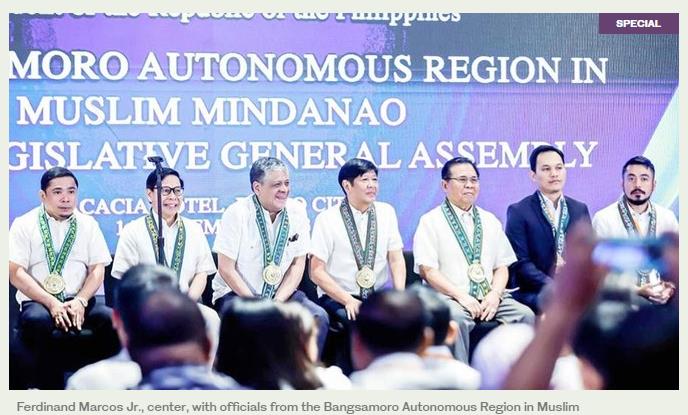
Among the key challenges for the Bangsamoro peace process will be the integration of 40,000 former insurgent fighters into civilian life
MANILA: As terrorist groups continue to threaten peace in the region, the US Department of Defense (Pentagon) has emphasized the importance of the success of the Bangsamoro Autonomous Region in Muslim Mindanao (BARMM).
In a report to American lawmakers released this week, the Pentagon’s independent watchdog said that the “success or failure of the BARMM may influence future recruitment of Daesh in East Asia.”
BARMM is the new regional political entity established under the terms of a peace agreement between the Moro Islamic Liberation Front (MILF) and the Philippines government ratified early this year.
It is designed to provide enhanced self-governance to the Muslim-majority provinces of Lanao del Sur (including Marawi), Maguindanao, Basilan, Sulu, Tawi-Tawi and parts of North Cotabato.
Citing a report issued by the International Crisis Group, a nongovernmental organization that studies violent conflicts, the OIG said that “if the BARMM could meet popular expectations regarding delivery of public services, such as health, education and infrastructure, it could mitigate the anti-government sentiments that have historically driven Islamist militancy in the Philippines.”
But it also warned that failure of the BARMM, either through internal shortcomings or external pressure from insurgents, could generate frustration and reinvigorate jihadist sentiments.
“This quarter, the Muslim-majority provinces of the southern Philippines worked to establish a new, semi-autonomous regional government ... However, the regional government faced challenges because of a lack of resources and because many of its leaders are former militants who lack experience in governance,” wrote acting DoD inspector general Glenn Fine in the quarterly review of the Operation Pacific Eagle-Philippines (OPE-P). Launched in 2017, OPE-P aims to support the Philippine government in its efforts to counter Daesh affiliates and other violent extremist organizations in the Philippines.
Among the key challenges for the Bangsamoro peace process will be the integration of 40,000 former insurgent fighters into civilian life.
“Fighters who disapprove of the benefits package offered in exchange for their decommission might be inclined to join violent extremist groups outside the peace process,” the OIG report said.
Despite these concerns, the Philippines government is optimistic about the decommissioning of the former MILF combatants, which it hopes will encourage other armed groups in Mindanao to turn in their weapons.
Presidential Peace Adviser Carlito Galvez said that former members of the MILF’s Bangsamoro Islamic Armed Forces (BIAF) who undergo the decommissioning process will receive a comprehensive and sustainable socio-economic package.
“Now, if the other armed groups will see the fruits of this process, I believe they will be encouraged to join in the decommissioning process,” Galvez said in a statement.
Aside from the Moro fronts whose members still bear weapons, there are also other armed groups operating in Mindanao such as private armies, communist insurgents and extremist organizations.
According to Galvez, the main goal of the government is for non-state armed groups to become irrelevant. Based on his informal conversations with representatives of these armed groups, the official said that some of them have already expressed their desire to be part of the decommissioning process.
“The willingness to give up their firearms is already a sign that they want to change their lives,” Galvez said.
Under the normalization track of the government peace deal with the MILF, the combatants, their families and communities will receive a package that includes a social protection package, sustainable livelihood programs, capacity-building trainings, health benefits and educational assistance.
Through these interventions, it is envisioned that the ex-fighters will be able to return to mainstream society, and the six government-acknowledged MILF camps and communities will be transformed into peaceful, productive and resilient communities.
For this year, at least 30 percent or 12,000 combatants will be decommissioned and their weapons put beyond use. Another 35 percent of the MILF forces will undergo the same procedure next year, while the rest will undergo the process until 2022 in time for the exit agreement between the government and the MILF.
The decommissioning process is scheduled to begin on Sept. 7.
Meanwhile, the Pentagon IG reported that Daesh-East Asia (EA) threatens peace in the region despite a lack of unified leadership and organization.
Daesh-EA continues to operate without a leader, as it has since its first “emir,” Isnilon Hapilon, was killed by government forces in the 2017 Marawi siege.
“According to USINDOPACOM, Abu Sayyaf Group (ASG) sub-commander Hadjan Sawadjaan was selected by a large segment of Daesh-EA as the group’s new emir in 2018. However, some faction leaders opposed his selection, and he has not been officially confirmed in the role by Daesh-Core,” the Pentagon IG report stated.
Despite the lack of unified leadership, Sawadjaan has established himself as the most influential Daesh-EA leader in the Philippines, commanding the largest faction of fighters.
He was also implicated in the Philippines’ two deadliest terrorist attacks of 2019 — the cathedral bombing in January and the Indanan army camp attack in June, which took place within 10 miles of each other on the island of Jolo.











